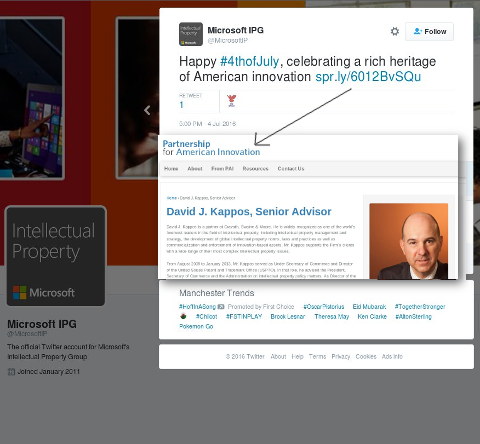

SOFTWARE patents are dying in the US and as we noted here yesterday, the "patent global warming" -- as Benjamin Henrion habitually calls it -- cools down a bit. The National Law Review (based in Chicago, i.e. US-centric) has a new series of articles the latest part of which discusses software patents (versus copyright on code) and correctly says that "the Alice Corp v CLS Bank Int’l decision at the US Supreme Court which made it much harder to patent software." Asserting existing (old) software patents in a court of law has become even harder, as the USPTO has a build-in conflict of interests (so-called 'production' versus quality control -- the same problem we now see at the EPO). So yes, Alice became a nightmare to big patent bullies like Microsoft and IBM (the previous employer of Kappos).
"Asserting existing (old) software patents in a court of law has become even harder, as the USPTO has a build-in conflict of interests (so-called ‘production’ versus quality control — the same problem we now see at the EPO)."Microsoft now links to David Kappos (its anti-Alice lobbyist) and his Web site which promotes software patents. "Patents Fuel the American Dream" is the title and Microsoft has just piggybacked US Independence Day for this lobbying push (opportunistic marketing stunts that strive to associate patent maximalism with patriotism). Benjamin Henrion responded by saying that "patents fuel the American nightmare." It's especially true for software developers, who are often hit by patent trolls that almost always use software patents.
Last week we wrote about the Sequenom decision (or lack thereof), which was good news for abolishers of software patents. Glyn Moody, who wrote a book on the subject on genome monopolies, said that "Diagnostic Patents Suffer Another Setback In US As Supreme Court Refuses To Hear Sequenom Appeal" (more about Mayo than about Alice). To quote Dr. Moody:
In recent years, there have been a couple of really important US Supreme Court decisions in the biotech field. One is the 2013 judgment striking down gene patents. The other is a ruling from 2012 that rejected the patenting of basic medical diagnostics, in a case involving Mayo Collaborative Services and Prometheus Labs. The resultant loss for biotech companies in terms of devalued patent portfolios, and their reduced ability to control the market using intellectual monopolies, has been so serious that it is no surprise that there are periodic attempts to get these decisions mitigated through subsequent court rulings.
[...]
Although the industry will doubtless whine about how there is no incentive to produce new diagnostic tests, there's no evidence that research and development in this area has ground to a halt in the US since the Supreme Court ruling on Mayo. All that has happened is that obvious applications of natural biological phenomena have been removed from patentability. Given the inherent reasonableness of that, we can probably hope that further challenges to Mayo will also fail.